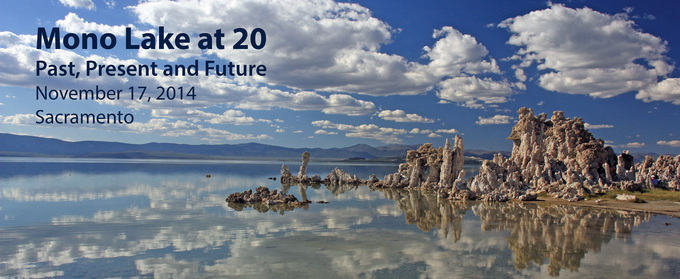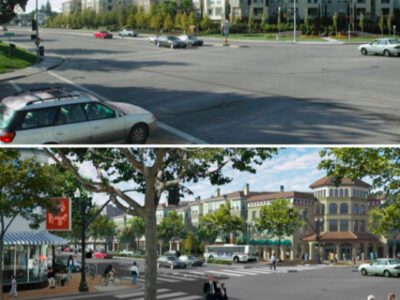Mono Lake at 20: Past, Present and Future
Symposium in Sacramento, November 17
Please join us as the UC Berkeley School of Law, with stakeholders in the Mono Lake Cases, convenes a symposium in Sacramento on November 17, 2014, to mark the 20th anniversary of the State Water Resources Control Board’s Decision 1631.
Panel presentations feature an cast of thought leaders, including:
- Marty Adams (Los Angeles Department of Water & Power)
- Tom Birmingham (Westlands WD; former counsel to Los Angeles Department of Water & Power)
- Martha Davis (Inland Empire Utilities Association, formerly Mono Lake Committee)
- Felicia Marcus (State Water Resources Control Board)
- Geoffrey McQuilkin (Mono Lake Committee)
- Tim Quinn (Association of California Water Agencies)
- Lester Snow (California Water Foundation)
- and many more
WHERE: Byron Sher Auditorium, CalEPA Headquarters, Sacramento, CA
WHEN: November 17, 2014
Program runs 8:30-5:30
Check-in begins at 8:00
Lunch and coffee will be served, and a reception will follow immediately after the program.
Space is limited, so preregister here.
BACKGROUND
In 1983 the California Supreme Court directed the SWRCB to amend Los Angeles Department of Water and Power’s water rights to protect Mono Lake and its tributary creeks. In 1994, the SWRCB issued Decision 1631, its landmark decision in the Mono Lake Cases. The decision was the first in the state’s history to integrate the Water Code, Fish and Game Code, and the common law of public trust, to achieve such a result.
The symposium will address a number of fundamental questions. What are the actual results of implementation of D-1631? What does the decision mean for other water rights, as the State Water Board seeks to determine how best to protect public trust uses of the Delta and Central Valley rivers WHEN: Tuesday, November 19th, 12:15pm to 1:45pm
This effort will extend the academic symposia at UC Davis in 1980 and 2011 in several intentional ways. Building on the doctrinal syntheses of the Public Trust Doctrine developed by the scholars at UC Davis, we will seek to move from problem definition towards solutions statements. The symposium will do so by bringing together panelists from multiple perspectives to distill lessons learned from twenty years of concerted effort, placing them in the context of institutional, fiscal, and ecological realities.
D-1631
Under D-1631, DWP releases flows required to raise Mono Lake to 6,391 feet above sea level, and to restore the tributary creeks. DWP also is implementing non-flow measures to restore fish and waterfowl habitat, along with comprehensive monitoring programs.
Since 1994 Mono Lake has risen as high as 6,385 feet MSL, although it stands at 6,380 feet today due to the drought. Attainment of the management level will likely require another decade or more. In 2013 DWP and other parties reached a Settlement Agreement proposing to modify the flow releases, the operation of DWP’s storage facility in the Mono Basin (Grant Dam), and the monitoring programs, to improve the environmental benefits while not increasing the water supply impacts.
PROGRAM
Speakers and panelists include an all-star cast, all of whom have been involved with the Mono Lake Cases or their subsequent implementation.
Session 1. Retrospective on Mono Lake Cases
What motivated the Mono Lake Cases? Which of the legal, political, and physical factors drove the cases, and specifically, contributed to the creative approaches to squaring water supply and public trust? Why were the cases a turning point in California water law?
Session 2. Outlook for Mono Lake and its Creeks
What progress has been made to restore public trust uses of Mono Lake and its tributary creeks? How well have the monitoring programs worked to inform adaptive management of the flow schedules and other restoration measures?
What does the future hold for the Mono Basin? How will the 2013 Settlement affect the continued implementation of D-1631?
Session 3. Implications of Changes since 1994 in California’s Water Rights System
Following the Mono Lake Cases, how have the SWRCB and courts implemented this precedent in regulating other existing water rights or granting new rights? How well is the water rights system working to manage conflicts between beneficial uses?
Session 4. The Future: Applying the Public Trust to the rest of California
The Mono Lake Cases involved a single water right holder controlling the affected waters. Does the precedent of these cases work effectively in the much greater scale and complexity of the Central Valley and other watersheds in the State? If so, how?
Is the public trust doctrine a useful authority to address climate change and other non-stationary stressors for our aquatic ecosystems?
REGISTRATION AND SYMPOSIUM INFORMATION






Reader Comments